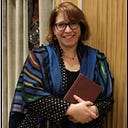Gleanings: Actions & Remembrances Towards Global Equality
Emor 2021, Rabbi Lauren Grabelle Herrmann
The second section of Parshat Emor which we read this past Shabbat shifts the focus from the priests to the people who are instructed to celebrate the holy days year, proclaiming them as sacred occasions.
The section begins with the initial offering of the harvest, the counting of seven weeks for the Omer period, culminating with the sacrifices and celebration of the first fruits of the harvest at Shavuot.At this point we hear these words: “And when you reap the harvest of your land, you shall not reap all the way to the edges of your field, or gather the gleanings of your harvest; you shall leave them for the poor and the stranger: I the LORD am your God.”
While the commandment of Peah (gleanings) is a vital one that sets the standard for Jewish notions of Tzedakah, its placement here is odd and disruptive of what otherwise would be a continuous list of holidays and their observances. There is no other non-sequitur in this section. What’s even more strange is that just a few chapters back in Leviticus 19, we hear virtually the same words instructing us to leave the corners of our fields unharvested in order for the poor to find sustenance with dignity. Why does the sparse torah text feel the need to reiterate this commandment a second time? And why here in this litany of holidays and harvests?
Nehama Leibowitz, the great scholar and Bible teacher, explains that the festivals, especially the marking of the completion of the harvest season, are a particularly joyous time. In a time of great joy and celebration when we are focused on what we have, we might forget or leave behind the poor and less fortunate. Peah in this section of the torah reminds us that when we are rejoicing, we must also remember those who are less fortunate.
Leibowitz seems to be saying something quite new in this section: that the commandment of Peah- of leaving the corners for the poor to glean — is both an instruction to act in accordance with the ideals God is setting out for us and as a consciousness raising tool. That is to say that leaving the corners of the fields is about giving tzedakah — but it is also about raising our awareness, especially in times when we might be prone to forget. With awareness comes the possibility of recognizing the inequality rooted in the system.
This Shabbat feels a little bit like that joyous moment of harvest. I stand here in the SAJ sanctuary and there are a group of SAJ members here with me as we mark the beginning of a reopening of our community. 46% of New Yorkers have received at least one dose of the vaccine. Over 30% of American citizens have done the same. While I wish it was even higher, it’s a step in the right direction.. COVID positivity rates are decreasing in our city as are the number of fatalities from the illness. The weather is beautiful and many of us (though not all) feel like we are getting our lives back. Hodu L’adonai Ki Tov — Give thanks to the Divine for God is good. It is indeed a time of thanksgiving and JOY!
In the spirit of Leibowitz’s teachings, we are inspired to act but also to remember that at the moments of greatest joy, we also should remember for those who do not have the great fortune that we do. While we need to do — to leave out what we can — the act of remembering itself has importance. At this time of our rejoicing, I want to invite us to bring into consciousness and compassion all those in the Global South whose access to vaccines is 6 months to years behind the United States. According to the Kaiser Family Foundation, although high-income countries only account for 19% of the global adult population, collectively they have purchased more than half (56%) of global vaccine doses to date. Further, high income countries currently have enough vaccine doses to cover more than twice their adult populations, while lower middle income countries only have enough vaccine doses to reach ⅓ of their populations. We have been following the horrible news of the pandemic in India and are painfully aware of the vast inequities that predated the pandemic to create this situation and of the current inequities that make what is happening so much worse, with so many more lives lost. Further, India is also a producer of vaccines for the Global South- without the capacity to produce more vaccines, there will be exponentially more loss.
As was written in this Kaiser report: “Unless these doses are redistributed, huge inequities in vaccine distribution will persist, presenting a major challenge to achieving global population immunity.” Can the US and other developed countries find a way to enact Peah in our day? Can we find a way forward so that we increase access to the harvest of vaccines?
As for us, we are commanded to leave the corners of our fields for the poor. We no longer have corners, but we do have bank accounts. Let us give what we can. And as I draw from Leibowitz, awareness is also an important aspect of the mitzvah of Peah. When we are in our greatest joy and celebration of the harvest of our lives and all that is possible, we are to also remember those who are not so fortunate.To remember that there are people who suffer as we gain. This awareness is a powerful beginning to a consciousness that can fuel our drive for a more equitable distribution of resources.
May all those who suffer find safety. May this plague be lifted and may we bend our world towards equality and justice.
Shabbat Shalom.
